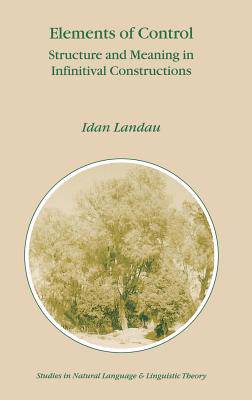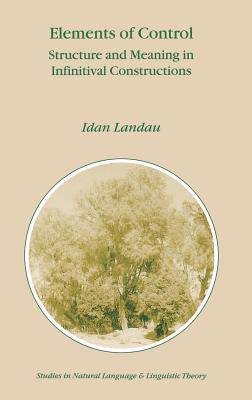
Door een staking bij bpost kan je online bestelling op dit moment iets langer onderweg zijn dan voorzien. Dringend iets nodig? Onze winkels ontvangen jou met open armen!
- Afhalen na 1 uur in een winkel met voorraad
- Gratis thuislevering in België vanaf € 30
- Ruim aanbod met 7 miljoen producten
Door een staking bij bpost kan je online bestelling op dit moment iets langer onderweg zijn dan voorzien. Dringend iets nodig? Onze winkels ontvangen jou met open armen!
- Afhalen na 1 uur in een winkel met voorraad
- Gratis thuislevering in België vanaf € 30
- Ruim aanbod met 7 miljoen producten
Zoeken
€ 83,95
+ 167 punten
Uitvoering
Omschrijving
This work offers an outlook on the derivation and interpretation of control constructions. From data and observations, it argues that obligatory control comes in two varieties: exhaustive or partial control, the latter obtaining when PRO properly includes the controller. This distinction, arguably universal, is tightly linked to the tense specification of the infinitive. Non-obligatory control, on the other hand, is structurally conditioned, obtaining only in VP-external infinitives. A detailed investigation of how control interacts with super-equi constructions and psychological predicates sheds new light on issues such as extraposition, argument structure, and semantic selection. This book clears up some common misconceptions about the nature of control, as well as sharpening the empirical challenges that face any comprehensive theory in this domain. Regardless of theoretical framework, scholars of syntax and semantics interested in these topics, should find this book a major contribution to the field.
Specificaties
Betrokkenen
- Auteur(s):
- Uitgeverij:
Inhoud
- Aantal bladzijden:
- 228
- Taal:
- Engels
- Reeks:
- Reeksnummer:
- nr. 51
Eigenschappen
- Productcode (EAN):
- 9780792366201
- Verschijningsdatum:
- 30/11/2000
- Uitvoering:
- Hardcover
- Formaat:
- Genaaid
- Afmetingen:
- 165 mm x 247 mm
- Gewicht:
- 503 g

Alleen bij Standaard Boekhandel
+ 167 punten op je klantenkaart van Standaard Boekhandel
Beoordelingen
We publiceren alleen reviews die voldoen aan de voorwaarden voor reviews. Bekijk onze voorwaarden voor reviews.











